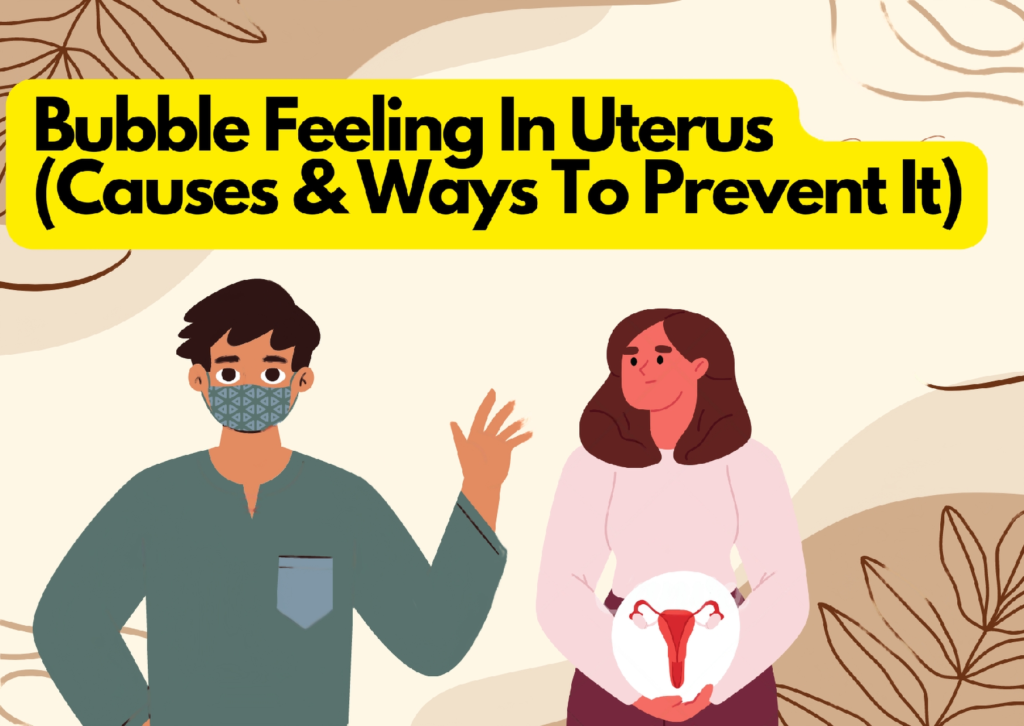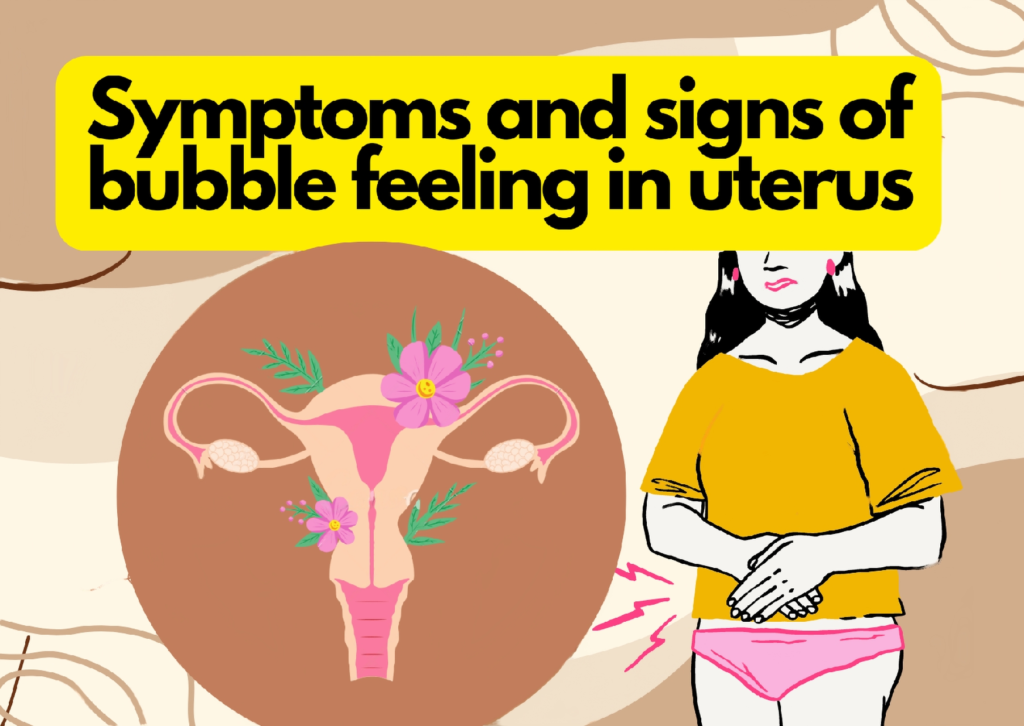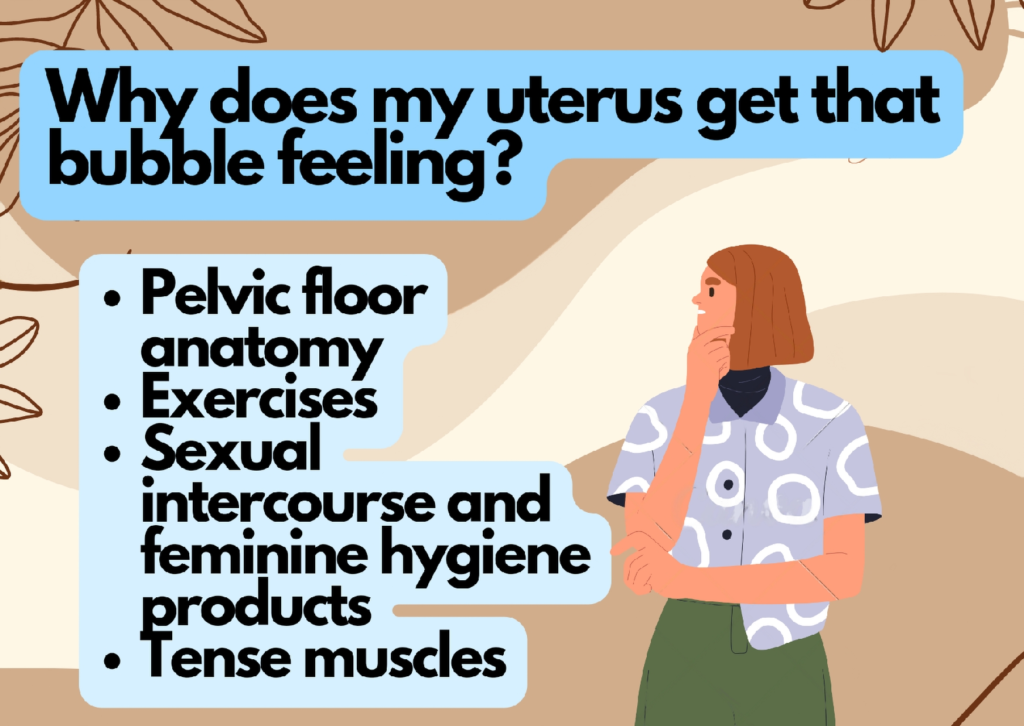Bubble feeling in uterus when you are not pregnant can be a disconcerting experience that may leave you feeling worried and confused. While not a common occurrence, this sensation can be caused by several factors and can have a variety of underlying medical reasons. Understanding the causes and ways to prevent it can help alleviate any discomfort and give you peace of mind. In this article, we will discuss the potential causes of bubbles in the uterus and provide some effective ways to prevent it, so you can feel confident in your physical health and well-being.

What are the Symptoms of bubble feeling in uterus?

The feeling of bubbles in the uterus when you are not pregnant can be a sign of an underlying health condition and should be taken seriously. It can be a perplexing symptom, which can cause discomfort and worry among women. This feeling of bubbles or fluttering in the lower abdomen is often described as a sensation similar to early fetal movements during pregnancy. However, when it occurs outside of pregnancy, it could be an indication of various health issues.
One of the common causes of bubble feeling in the uterus when you are not pregnant is gas or bloating. Gas accumulation in the intestines can cause discomfort and a feeling of movement in the abdomen. Eating gas-producing foods, such as beans and carbonated beverages, can aggravate this symptom. Additionally, irritable bowel syndrome (IBS) can lead to chronic bloating and cramping, which can cause a continuous sensation of bubbles in the lower abdomen.
Another possible cause of bubble feeling in the uterus is ovarian cysts. These are fluid-filled sacs that can form on the ovaries and cause discomfort or pain in the lower abdomen. In some cases, ovarian cysts can rupture, leading to sudden and severe pain.
Endometriosis is another potential cause of bubbles in the uterus when you are not pregnant. This is a condition in which the tissue that lines the uterus grows outside of it, causing pain, heavy periods, and infertility. Endometrial tissue can also form cysts on the ovaries, leading to discomfort and a feeling of pressure or bubbles in the lower abdomen.
In rare cases, bubbles in the uterus can be a sign of cancer. Ovarian or uterine cancer can cause abdominal bloating, pain, and a sensation of movement or bubbles in the lower abdomen.
What is the reason behind the bubble-like feeling in my uterus?

1. Anatomy of the pelvic floor
The uterus is a muscular organ located in the female pelvis, which is responsible for menstruation, pregnancy, and childbirth. The pelvic floor muscles support the uterus and other pelvic organs. These muscles can weaken or become stretched over time, leading to various symptoms such as urinary incontinence, pelvic pain, and discomfort during sexual intercourse.
When the pelvic floor muscles weaken, the uterus may shift or move slightly, causing sensations such as the feeling of bubbles or gas. This sensation may be more noticeable during certain activities, such as exercise or sexual activity, and may be accompanied by other symptoms such as back pain, discomfort during bowel movements, or urinary urgency.
Other possible causes of the feeling of bubbles in the uterus when you are not pregnant include hormonal changes, such as those that occur during the menstrual cycle or menopause, or digestive issues such as gas or bloating. In some cases, this sensation may be a sign of a more serious condition such as endometriosis or uterine fibroids.
If you are experiencing the feeling of bubbles in the uterus when not pregnant, it is important to speak with your healthcare provider to determine the underlying cause and receive appropriate treatment. Treatment may include pelvic floor exercises to strengthen the muscles, hormonal therapies, or other medications to manage symptoms.
2. Muscles that are tightened
Tense muscles can be uncomfortable and even painful. They can affect various parts of the body, including the neck, shoulders, back, and pelvic area. When muscles are constantly tense, it can lead to chronic pain and even injury.
In the pelvic area, tense muscles can cause a range of symptoms, including pain, discomfort, and even urinary incontinence. This can be particularly problematic for women, as the pelvic floor muscles are responsible for supporting the bladder, uterus, and rectum.
There are several factors that can contribute to tense muscles in the pelvic area, including stress, anxiety, poor posture, and lack of exercise. For women, pregnancy and childbirth can also contribute to pelvic muscle tension.
Fortunately, there are several ways to alleviate tense muscles in the pelvic area. These include pelvic floor exercises, also known as Kegel exercises, which can help strengthen and relax the muscles. Yoga, stretching, and massage can also be helpful in promoting muscle relaxation and reducing tension.
In addition to these methods, addressing underlying causes such as stress and poor posture can also be effective in reducing pelvic muscle tension. Practicing relaxation techniques such as deep breathing and meditation can help reduce stress, while maintaining good posture can help prevent muscle strain.
3. Exercises
The pelvic floor muscles support the uterus and other pelvic organs. Weakness or dysfunction of these muscles can cause various symptoms, including the feeling of bubbles in the uterus. Pelvic floor exercises, also known as Kegels, can help to strengthen these muscles and improve symptoms.
To perform pelvic floor exercises, start by identifying the muscles used to control urine flow. You can do this by stopping the flow of urine midstream. Once you have identified the correct muscles, contract them for 5 seconds, then relax for 5 seconds. Repeat this cycle for 10 repetitions, 3 times a day.
It is important to perform these exercises correctly to ensure effectiveness. Make sure you are contracting the correct muscles and not holding your breath or tightening other muscles such as your thighs or buttocks.
In addition to pelvic floor exercises, other exercises can also help improve pelvic floor function and reduce symptoms such as the feeling of bubbles in the uterus. Yoga and Pilates can be particularly beneficial as they focus on strengthening the core and pelvic muscles.
4. Physical intimacy and products for maintaining women’s hygiene
If you’re experiencing a bubbling sensation in your uterus when you’re not pregnant, it could be due to a few different factors, including sexual intercourse and feminine hygiene products.
During sexual intercourse, air can be pushed into the vagina and potentially travel up into the uterus. This can cause a bubbling or gurgling sensation, which is usually nothing to worry about and should subside within a few hours. If the sensation persists or is accompanied by pain or discomfort, it’s important to speak with your healthcare provider.
Feminine hygiene products, such as tampons or menstrual cups, can also introduce air into the vagina and potentially the uterus. This can occur if the product isn’t inserted properly or if it’s left in for too long. In some cases, this can lead to a condition called pneumonitis, which is an inflammation of the lining of the uterus due to the presence of air. Symptoms of pneumonitis include abdominal pain, bloating, and a bubbling sensation in the uterus.
To prevent these issues, it’s important to use feminine hygiene products correctly and change them regularly. It’s also a good idea to avoid douching or using any other products that could disrupt the natural balance of bacteria in the vagina, as this can increase the risk of infection and inflammation.
In rare cases, a bubbling sensation in the uterus when not pregnant could be a sign of a more serious condition, such as an ectopic pregnancy or pelvic inflammatory disease. If you experience persistent or severe symptoms, such as abdominal pain or fever, it’s important to seek medical attention right away.
What steps can I take to avoid the sensation of bubbles in my uterus?
Bubbles in the uterus when you are not pregnant can be a concerning and uncomfortable sensation for many women. Fortunately, there are several steps you can take to help prevent this sensation and improve your overall reproductive health.
One common cause of the bubble feeling in the uterus is gas. Gas can build up in the intestines and press against the uterus, leading to discomfort and the sensation of bubbles. To prevent this, it is important to maintain a healthy and balanced diet that includes plenty of fiber and water. This can help keep the digestive system regular and reduce the likelihood of gas buildup.
Another potential cause of the bubble feeling in the uterus is uterine fibroids. These are noncancerous growths that can develop in the uterus and cause discomfort, bloating, and pressure. While the exact cause of uterine fibroids is unknown, they are often linked to hormonal imbalances. To prevent uterine fibroids, it is important to maintain a healthy lifestyle that includes regular exercise, stress management, and a balanced diet.
It is also important to practice good menstrual hygiene to prevent infections that can cause discomfort and bloating in the uterus. This includes changing sanitary products regularly, avoiding scented products, and practicing safe sex.
If you are experiencing persistent discomfort or the sensation of bubbles in the uterus, it is important to consult with a healthcare provider. They can help identify any underlying causes and recommend appropriate treatment options, which may include medication, surgery, or other interventions.
What is the appropriate time to consult a doctor? For “bubbles or gas in the uterus”
Knowing when to see a doctor can be a difficult decision. It’s important to seek medical attention when you experience symptoms or notice changes in your body. In some cases, it may be tempting to wait and see if the issue resolves itself, but in many cases, seeking prompt medical care can make all the difference. One such issue that warrants immediate medical attention is the presence of bubbles in the uterus when you are not pregnant.
The presence of bubbles or gas in the uterus when you are not pregnant is a condition known as pneumo-uterus. It is a rare condition, but it can occur and may lead to serious complications if left untreated. Symptoms of pneumo-uterus include abdominal pain, bloating, and vaginal discharge. In some cases, the bubbles may also be visible on an ultrasound.
If you are experiencing any of these symptoms, it’s important to see a doctor right away. Your doctor may recommend a series of tests to diagnose the issue, including a pelvic exam, ultrasound, or CT scan. Treatment for pneumo-uterus may include the use of antibiotics to prevent infection, as well as the use of a catheter to drain any fluid or gas that has accumulated in the uterus.
In some cases, pneumo-uterus may be caused by an underlying medical condition, such as endometriosis or a uterine fibroid. Your doctor may recommend additional tests or procedures to determine the underlying cause of the bubbles in your uterus.
FAQs
Q: Does a bubbly feeling in the uterus cause complications?
A: A bubbly feeling in the uterus may indicate the presence of pneumo-uterus, which is a rare condition that can lead to serious complications if left untreated. Symptoms of pneumo-uterus include abdominal pain, bloating, and vaginal discharge. If you are experiencing any of these symptoms, it’s important to seek medical attention right away.
Q: How do you know if something is wrong with your uterus which cause bubbles?
A: There are several signs and symptoms that may indicate that something is wrong with your uterus, including:
- Abnormal vaginal bleeding or discharge
- Pain during intercourse
- Pelvic pain or pressure
- Difficulty urinating or having a bowel movement
- Changes in your menstrual cycle
- Fatigue or weakness
If you are experiencing any of these symptoms, it’s important to see a doctor right away. Your doctor can perform a pelvic exam, ultrasound, or other tests to determine the underlying cause of your symptoms and recommend the appropriate treatment.
Conclusion
Feeling bubbles in the uterus when you are not pregnant can be caused by a variety of factors such as gas, fibroids or polyps, and even stress and anxiety. If you are experiencing this sensation, it’s important to see a doctor to rule out any underlying medical conditions. However, there are ways to prevent it such as avoiding foods that cause gas, regular exercise, practicing relaxation techniques, and staying hydrated.
It’s important to take care of your overall health and well-being to avoid any discomfort or physical symptoms. By making lifestyle changes and seeking medical attention when necessary, you can reduce the likelihood of experiencing bubbles in the uterus and live a healthy, comfortable life.






